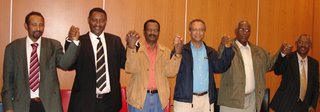(By Paulos Dandego, Ethiopian Politics Contributor)
“What's holding down Africans is actually the bad governments, the bad policies that make it difficult for Africans to make use of their own property, What the aid money is doing to Africa is to subsidize the bad policies that are making Africans poor."
James Shikwati, director of the Inter Region Economic Network
Since the 2005 elections the Ethiopian Government has increasingly imitated its predecessor, the Marxist junta (the Dereg), and yet amazingly has managed to keep the support of most western donor countries in the process.
It has imprisoned thousands, killed hundreds and sent many into exile. Renowned organizations such as amnesty international, the Committee to protect journalists and others have issued statement after statement condemning these atrocities but still couldn’t stop the millions of dollars in aid money provided for the government in a variety of forms.
The "direct budgetary cuts" announced by the donor nations previously coupled with the insistent cry for democracy from its own people was leaving the government little choice but to negotiate, compromise and heed the voice of reason. But alas, here comes the World Bank to the rescue. It is clear to anyone who has been following events in Ethiopia that this aid money will be used by the government to strengthen its muscles and continue on the path of repressing and terrorizing its citizens into submission.
The World Bank group has approved a plan to, as they put it, “preserve the delivery of basic services”. This they say is not “direct budgetary support” to the government of Ethiopia but rather a way to continue sustaining basic services to the population through
grants to local governments.
Who are the local governments?In a
study published by the Chr. Michelsen Institute (CMI) entitled Ethnic Federalism in a Dominant Party State: The Ethiopian Experience 1991-2000, the author states:
"Centralization of federal-regional relations in Ethiopia has severely undermined the federal division of power. This implies that the regional governments are not able to act independently from the federal government and are acting more or less as extended arms of the party in power at the central level.......the Ethiopian federation was introduced in an undemocratic manner. There was no genuine bargaining between different political forces, and the federal constitution was practically imposed from above by the ruling party. The study of the functioning of the federal system revealed that the ruling party uses force and intimidation to control regional affairs. Due to these circumstances, it is possible to argue that the Ethiopian federation can be seen as a result of and is maintained by coercion from above. Accordingly, if we follow the argument above, the Ethiopian polity should not be defined as genuinely federal.
The Economic expert from addis ferengi’s highly informative
interview affirms:
Each and every regional government is controlled by the very same ruling party, EPRDF, that had broken the donors’ trust! Whether they provide aid to the federal or the regional governments, the former are tightly controlled by the latter, so donors have in a sense deceived both the Ethiopian people and their own taxpayers by structuring the PBS the way they did.
But what is wrong with giving aid money to the government? Doesn’t that alleviate poverty and help the country prosper?
It has recently been learned that Ethiopia has received over twenty one billion dollars in aid money since the EPRDF took over in 1991, yet still we have seen no significant progress.
Reporter JOHN STOSSEL did an interesting research on this subject for his show/book entitled "Myths, Lies & Downright Stupidity."
Here’s an excerpt:
Two studies by World Bank economists say foreign aid is one of the problems because "higher aid levels erode the quality of governance."
Former World Bank economist William Easterly agrees. His new book, "The White Man's Burden," argues that Western efforts to cure poverty in the rest of the world have done more harm than good.
"Aid has the perverse effect that it makes [African] politicians much more oriented toward what will get them more money from the West than it does to making them meet the needs of their own people, which is really a scandal," he said.
Fifty years ago, countries in East Asia were as poor as Africa. Now many are rich, despite much lower levels of aid because their governments created understandable laws so people could trade, borrow and start their own businesses.
He finish off with this statement:
It's good to help. I'll contribute to a charity like "The Free Africa Foundation," which builds malaria-free villages from individual contributions. Charities are much more likely to keep a close eye on the money. If they don't, donors stop giving.
By contrast, foreign aid often just makes politicians rich — but leaves their people poor.
This
declaration made by the Sister of a 17-year old shot dead by government forces in the aftermath of the May 15, 2005 election, is a clear message to all who wish to know how to really help the poor in Ethiopia -
a message to all donors.
“Please tell them this: We don't want bread. We don’t want money. But please don't allow the government to take away our hope."
-----------------------------------------------------------------
Need more info. on this subject? Listed below are some excellent opinions and analysis essays that explore this topic:
World Bank vs Ethiopia: Response to Dr. Ishac Diwan's letter by the Ethiopian American Civic Advocacy
Donor ‘Good Governance’ Rhetoric vs. Democratic Governance by The Network of Ethiopian Scholars (NES)
Is aid in Ethiopia a tool for, or a hindrance to, poverty reduction?
Addis ferengi - Protection of basic services... a disguised budgetary support granted to regions?
Mr. Obang O. Metho, Director of International Advocacy, Anuak Justice Council (AJC): Statement to the World Bank, Washington DC.
World Bank, PBS, and Aid Politics for Dummies: Part 1 (weichegud! ET politics)


